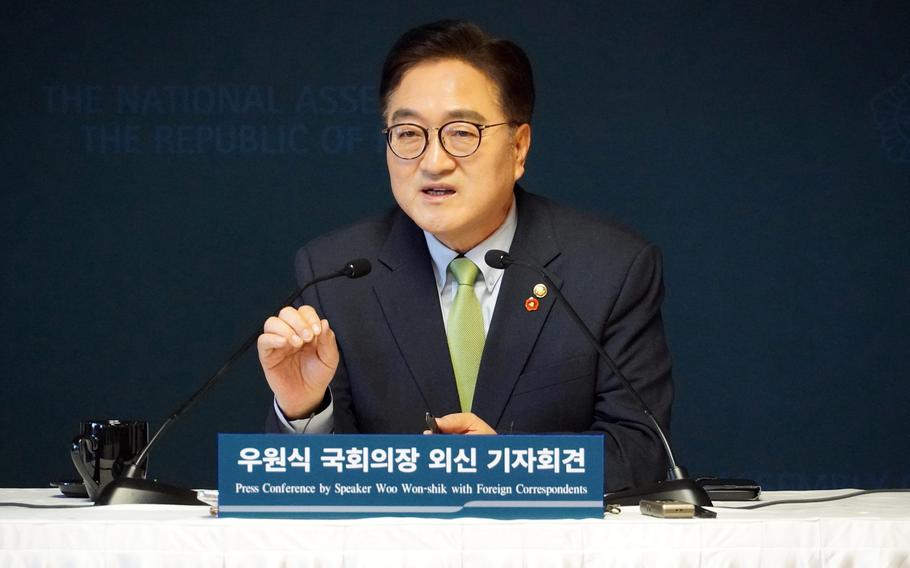
South Korean National Assembly Speaker Woo Won-shik discusses martial law with reporters in Seoul, South Korea, Dec. 19, 2024. (David Choi/Stars and Stripes)
SEOUL, South Korea — Impeached South Korean President Yoon Suk Yeol likely kept the United States in the dark about his plan to declare martial law on Dec. 3 to avoid interference with his decree, the National Assembly speaker told reporters Thursday.
Woo Won-shik, a member of the South Korean opposition Democratic Party, said “it would have been difficult” for Yoon if the U.S. had known about his plans, which ultimately failed.
Woo didn’t elaborate on why he thought that was likely, or whether he believed the U.S. should have been consulted.
Spokesmen for the U.S. Departments of State and Defense, speaking the day after the attempted martial law, said their departments had no advance notice of Yoon’s plans.
The U.S. has about 28,500 troops stationed in South Korea, most of them at Camp Humphreys, about 40 miles south Seoul.
Woo met with U.S. Ambassador Philip Goldberg in Seoul on Dec. 12 to discuss Yoon’s martial law declaration and to reaffirm their countries’ cooperation on economic and security matters.
“We both agreed that the U.S.-[South Korea] alliance is strong and enduring,” Goldberg said that day on social platform X.
U.S. Secretary of State Antony Blinken said Washington had no advanced notice of Yoon’s plans, according to a Reuters report Dec. 5.
“We are certainly not routinely informed of every decision that any partner may be making anywhere around the world at any given time,” he said in an interview with the news outlet in Brussels.
The National Assembly voted to overturn Yoon’s declaration in an overnight vote about six hours later. Woo, sentenced to a three-year prison term for protesting former President Chun Doo-hwan, said he would climb over the National Assembly’s walls to veto another martial law attempt.
Yoon withdrew the declaration that night. Blinken the next day said he welcomed that decision.
“We continue to expect political disagreements to be resolved peacefully and in accordance with the rule of law, Blinken said.
Yoon’s abrupt declaration faced backlash from South Korea’s Democratic Party as well as members of the ruling People Power Party. He was impeached by the National Assembly on Saturday after a failed attempt a week earlier.
Yoon defended his martial law decree in a televised speech Dec. 12, saying it was to prevent “anti-state forces” from impeding legislation and the Democratic Party’s series of impeachment motions against appointed government officials.
Woo described Yoon’s reasoning as “absurd” and vowed South Korea’s political climate will return to “normalcy.”
“[South Korea] is going through a process of forging our democracy,” he said Thursday. “After going through this process, [South Korea] will emerge as a more stable and advanced democracy.”